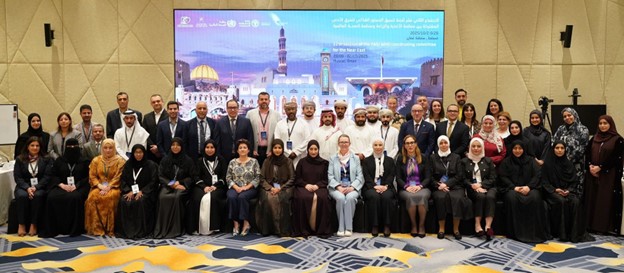Near East countries reaffirm commitment to food safety and regional standards at CCNE12 in Oman

Delegates from across the Near East region convened in Muscat, Oman, from 28 September to 02 October 2025 for the 12th Session of the FAO/WHO Coordinating Committee for the Near East (CCNE12), the first time in more than a decade that the Committee met within the region. Hosted by the Government of the Sultanate of Oman, the meeting marked a renewed commitment to advancing food safety, harmonizing regional standards, and strengthening cooperation among Member Countries.
In his keynote address, Eng. Saleh Al-Shanfari, Chairman of Oman’s Food Security Committee, stressed that food safety and quality are central to consumer trust and market access. He called for closer cooperation between regulators and the private sector, transparent labelling, and improved consumer awareness to ensure confidence in both local and imported food products.
Thaer Yaseen, Head of Mission of FAO in Oman, commended the Government of Oman for its leadership, noting that “Codex is more than a set of standards, it is a platform where governments, producers, industry, and consumers come together to harmonize practices, reduce risks, and build consumer trust.”
Opening the session, Dr Hussein bin Samh Al Masroori, Director-General of the Centre for Food Safety and Quality in Oman, emphasized the importance of collaboration to “chart a more ambitious future for food safety and quality in the Near East.” The session was chaired by Dr Intisar Al-Gharibi, Director of the Department of Risk Assessment and Crisis Management at the Food Safety and Quality Center, who was appointed as the new Regional Coordinator for the Near East.
FAO emphasizes regional cooperation for safer food systems
Representing the Food and Agriculture Organization of the United Nations (FAO), Moustapha Mohamed, the Regional Food Safety Officer for the Near East and North Africa (RNE) reaffirmed FAO commitment to supporting safe, resilient, and inclusive agrifood systems in line with the FAO Strategic Framework 2022–2031 and the vision of the Four Betters: Better Production, Better Nutrition, a Better Environment, and a Better Life.
During discussions on regional food safety and quality, FAO and World Health Organization (WHO) presented ongoing collaborative efforts aligning the FAO Strategic Priorities for Food Safety with the WHO Global Strategy for Food Safety (2022–2030). This coordination ensures that country-level actions are complementary and mutually reinforcing.
FAO also launched a new regional study, “Food safety and quality in the Near East and North Africa - Mapping drivers, challenges and imperatives,” which identifies the NENA region’s main food safety risks and opportunities. The study provides the foundation for the ongoing Regional Food Safety Transformation Strategy Framework for Actions, developed under the One Health approach and Codex Alimentarius principles.
FAO highlighted progress in supporting Member Countries to strengthen their national food control systems through the FAO/WHO Food Control System Assessment Tool (FCSAT). Assessments have been completed in Sudan, Tunisia, Egypt, and an additional assessment in the United Arab Emirates expected to conclude later in 2025. FAO also noted its growing collaboration with the International Food Safety Authorities Network (INFOSAN) on the regional level through the first FAO/WHO INFOSAN regional meeting for the WHO Eastern Mediterranean and FAO Near East and North Africa regions, and the newly launched WHO Alliance for Food Safety, which supports surveillance and monitoring of foodborne diseases.
Strengthening regional standards and coordination
Delegates finalized the Regional Standard for Maamoul, a traditional Middle Eastern shortbread biscuit, and agreed to forward it to the Codex Alimentarius Commission for adoption. They also discussed revisions to the Standard for Olive Oils and Olive Pomace Oils (CXS 33-1981), the proposal by the United Arab Emirates for a new Codex standard for pasteurized camel milk, and ongoing work on topics such as food contact materials and Bisphenol A (BPA).
The Committee endorsed the Regional Work Plan for 2026–2027, which aligns with the Codex Strategic Plan 2026–2031. The plan aims to enhance participation of Near East countries in Codex processes, strengthen communication and data-sharing, and promote a farm-to-fork approach to food safety. Delegates highlighted the need for capacity-building, support to small and medium-sized enterprises, and stronger National Codex Committees to foster inclusive dialogue among stakeholders.
Building consumer trust through collaboration
FAO RNE reaffirmed its continued support to Member Countries in harmonizing food safety standards, enhancing preparedness for emerging risks, and promoting regional cooperation to ensure safer food and fairer trade across the Near East and North Africa region.
